Logosol Story


From the Wood Pile to the Global Market
Logosol founder, Bengt-Olov Byström, grew up on a farm, where it was essential to take good care of the resources available. Seeing fantastic raw materials like trees in the forest being cut into firewood made Bengt-Olov dream of creating a way to better make use of the wood: a machine that could cut up logs into valuable boards. This dream eventually came true.
When the Logosol chain sawmill was demonstrated for the first time at trade shows, Bengt-Olov’s fascination was shared by prospective customers. When seeing the product, spectators were able to see the value of their own forest properties. What were the possibilities? What dreams of wood were created at that moment?
In 2019, Logosol celebrated 30 years as a business, with 40,000 sawmills and 10,000 planers sold in over 100 countries.


Impressed Customers - Our Most Important Gain
We at Logosol love seeing our customers use our products. All the thousands of stories we have heard over the years are a great motivator for us. When customers call and enthusiastically tell us about their projects, we are proud to share them with our co-workers.
It is fantastic when customers, who made their purchase 30 years ago, call and tell us about how they still look forward to cutting their first board each spring. It is amazing to think about all the businesses that have been built with the help of our machines, and it is with a big smile when we listen to families and friends that work together creating with wood. Every single story makes a lasting impression and is reason enough for us to continue developing awesome products. We offer quality and innovation that many can afford!
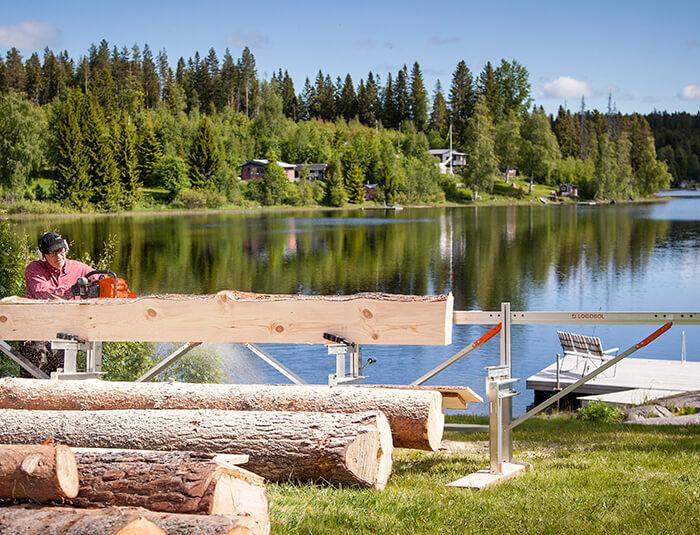

To Saw or Not to Saw - A Non-Issue
Commercially sawn or home-sawn lumber? Powder sauce or homemade bearnaise? It goes without saying that it makes a difference. With your home-sawn lumber, new opportunities open up. You can choose qualities, dimensions and types of wood you can’t find at the commercial lumber yard. It is also good to be able to make use of your woodland and create something from your own resources.
And, if this isn’t enough to convince you, we can promise that beer tastes better in a sauna that you yourself have built from the ground up!
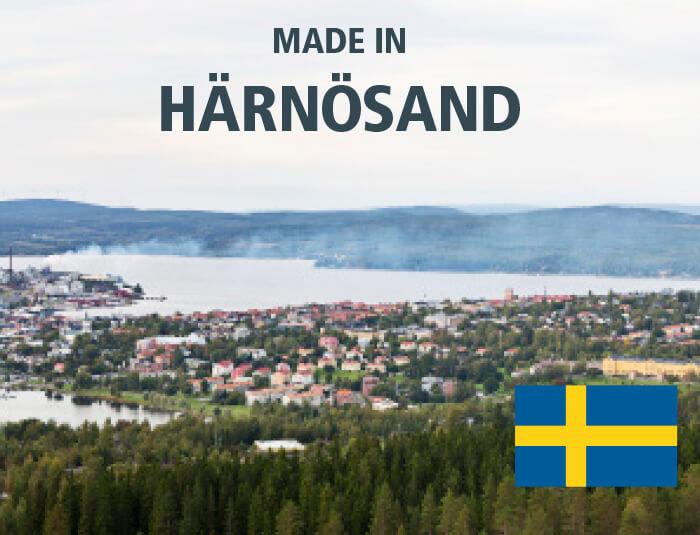

Made in Sweden – With the World as Marketplace
Logosol was launched in Härnösand, situated in northern Sweden. Forested land constitutes 75 percent of Sweden´s area, and it has always been an important part of the nation’s income. Swedish quality is appreciated all over the world. We want to live up to this reputation when creating equipment that helps take care of the valuable raw material our forests give us.


Machines That Bring Joy to Generations
The only thing our customers regret is that they did not buy earlier. A machine from Logosol is a long-term investment. Moreover, the house you build or the business you build with the help of our machines will most likely also bring joy for generations to come. With our machines, you don't need to contemplate your purchase at all, because satisfaction, pride, and enjoyment are guaranteed.
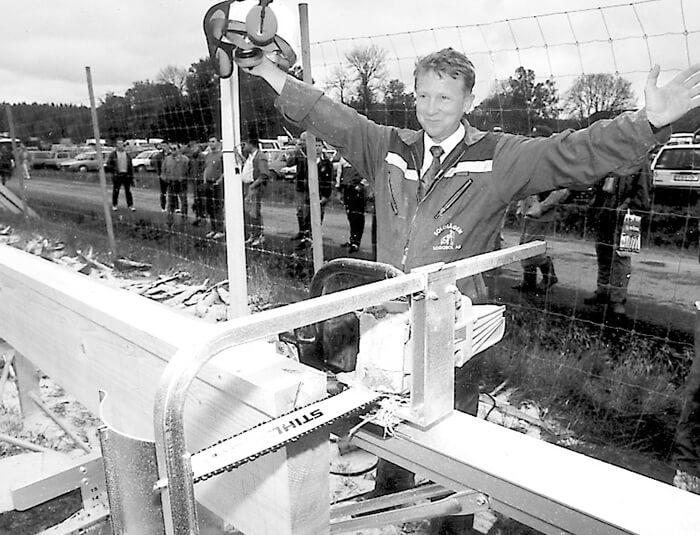

Series of World Records with Logosol Sawmills
The world record for the longest board, in the dimensions 2x4 inches, has repeatedly been set with the use of Logosol chain sawmills. Today’s world record is 38.9 meters which was set in 2006 by Anders Nykvist, who used Logosol sawmills connected in a series. With this in mind, it is obvious that you can extend your sawmill many times.
It Started with a Sawmill...
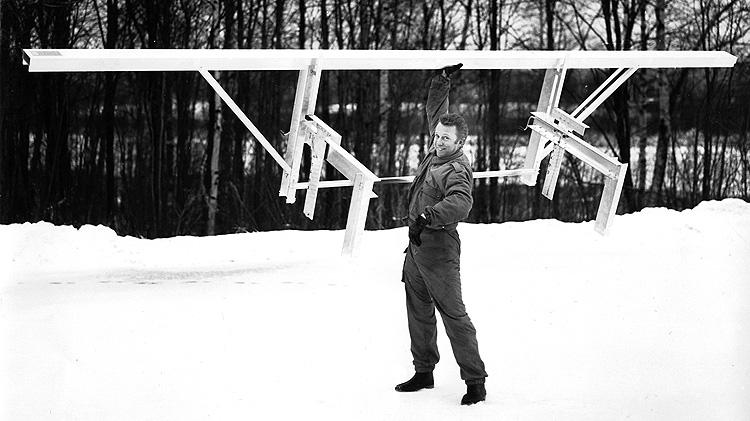

Bengt-Olov Byström lifts the first industrially produced Solo Saw Model 2, with one arm. The year was 1989. The saw bench weighed 37 kg without the chainsaw, so lifting was not completely effortless.
...and then grew into a global chain! (meaning many dealers worldwide)
In 2019, LOGOSOL celebrated its 30th anniversary. Join us on a journey through time!
It Started With an Idea
The idea behind the Solo Saw, Logosol's first product, was born in the village of Hundsjö, outside of Örnsköldsvik, where founder Bengt-Olov Byström grew up.
It all started with a conversation with his neighbor, Tord Gustavsson, who heard that chainsaws were used to cut wood in the United States.
To make a long story short, Bengt-Olov built the first Solo Saw out of wood. When it turned out to work better than expected, he constructed another saw bench from aluminium profiles. It required many profiles and a myriad of bolts and nuts, but the function was even better than on the original wooden stand. Thus the Solo Saw Model 1 was born.
An Explanation for the Name
The name Logosol was already used in the family business as the name of another product, a sun visor made of foam that one attached to the frame of glasses. It was sold as advertising merchandise for companies, whose names and logos were printed on the screen.
Logo + sun became Logosol.
First Time in Public
The Solo Saw was shown for the first time to a larger audience in Jönköping at SkogsElmia in 1989. It inspired enormous interest and divided the forestry field in Sweden into two camps. Some frowned at the small-scale production and authoritatively declared that something so simple could not work. Others immediately fell in love with the small sawmill.
The Guide Bar in Aluminium
At the time, Bengt-Olov was a consultant at a development fund in Västernorrland. Prior to that, he was a teacher and researcher in business administration at the Umeå School of Economics.
The first Solo Saws were made by the Byström family at home in their basement. During the same year, the business was incorporated and a workshop was rented.
One of the first steps was to get the homemade product manufactured professionally. The most important step was the development of the guide bar. This step was a big investment for the small company and several experts in the field were hired.
The guide bar profile is basically the same as the one used today, although manufacturing methods and surface treatment have been refined.
Help From a Delighted CEO
The next step was to find a powerful enough chainsaw to sell along with the Solo Saw. The right saws were available from several makes, but few were type-approved for the Swedish market.
A large Swedish manufacturer was approached several times but considered the market for portable sawmills too small to bear the cost of type approval. The help came from an important person in the industry who fell in love with the Solo Saw at first sight. His name is Hans-Peter Stihl, principal owner and at that time CEO of the world's largest chainsaw manufacturer, Andreas Stihl GmbH.
When the contact was established, Logosol was already using Stihl's second-largest chainsaw, the 064, with resharpened standard chains. Hans-Peter Stihl's commitment meant that today's PMX chain was developed.
Stihl's international organization also began selling the Solo Saw. Therefore, the saw was ready to be exported only a couple of years after its creation. The first significant export market was Germany and then Russia came into the picture early on.
Store or Mail Order?
In Sweden, Logosol was selling sawmills partly directly to customers, and partly via specialized dealers. It turned out that the Solo Saw was a difficult product to sell through ordinary equipment stores.
The machine itself was simple, but its use was more complicated. Customers needed support on a level that stores could not provide.
This led to Logosol focusing on direct sales through their own companies in important export markets.
Electrolux, the manufacturer that initially judged small-scale sawing as too small a market, later began selling mini sawmills under the names Husqvarna and Jonsered, but are no longer manufactured.
During the last twenty years, exports have increased sharply. Development took off in 1999 through the start of subsidiaries in the USA, Germany, and Norway. Since then, companies have been established in Finland, Poland, Great Britain, Australia, and Canada. Logosol currently sells directly or via importers from around 50 countries.
Electric Revolution
The next big step after the development of the guide bar was in 1993, with the creation of the electric saw unit E5000.
At the time, the available electric saws on the market were too weak for this type of sawing. In order to match the performance of the large petrol engines in Stihl saws, more powerful three-phase motors were required. Available engines were too large and heavy. Thankfully ABB developed a 5 kW motor with oversized windings with built-in temperature breakers, which provided a large motor in a small format.
The electric saw was joined two years later by the BS350 bandsaw unit. It is an example of the commitment among the staff at Logosol. The basic design was made at Logosol's Christmas party in 1995 and drawn on the tablecloth.
The first planer
The first planer was presented in 1994. The three-cutter panel planer later became a four-cutter planer three years later. In the same year, Logosol was awarded a prize for its business growth by the industry minister, Per Westerberg.
In the following year came the Solo planer, originally conceived as an advanced construction saw for re-sawing lumber. In 1995, the Solo Planer was awarded the prize Guldyxan (Golden Axe) by the Swedish magazine, Land, as the most innovative new product of the year.
At the same time, Logosol developed a program for the production of industrial machines. First up were the top ripsaw and the core ripsaw. The former is standard equipment on nearly all circular sawmills. The other, intended for core splitting logs before sawing, was appreciated by those who bought them but did not attract a large audience.
For several years, Logosol sold components for industrial stack cutters. Just in time for the tenth anniversary in 1999, Logosol presented its own stack cutter, a mobile construction that could be rolled to the timber package. Today it is an established machine even at larger sawmills.
Culture for Development
This is just a sample of the products that Logosol has created. Several have been ground-breaking and all are results of the creative culture at Logosol. Since customers have direct contact with Logosol, suggestions are constantly coming in. Since the staff at Logosol uses the equipment themselves, new accommodations and solutions are constantly being discovered.
The creative process often starts with an idea of a machine or accessory that could fulfill a certain purpose.
Marketing is a big part of any business. At the beginning of the Logosol story, resources were limited and the marketing mainly consisted of demos at fairs all over Sweden and the in-house newspaper Nysågat (Fresh Cut), which is now also available on the web, www.nysagat.se.
Currently, Logosol has a wide array of ways to reach customers and spread the Logosol philosophy, for example, the website http://www.woodworkingproject.com/ has articles translated into English.
In social media, we have a YouTube channel and an Instagram handle, both under the name ‘Logosol Portable Sawmills’.
World Records in a Row
Another activity that attracted a lot of attention is the world record for the longest plank, in the dimension of 2x4 inches. The first record was held in 1993 at the Noliamässan in Umeå and measured 25 meters, 57 cm. At SkogsElmia in 1995, one of the tallest firs was felled in Småland. It grew in the city park in Jönköping and was 37 meters high. With joint effort, Logosol's staff turned it into a Guinness-World-Record-approved plank of 33 meters and 4 centimeters.
The record was broken the following year by a customer in Austria, Thomas Rentenberg, with 34 meters and 7 centimeters. It was in turn surpassed by Logosol in 1999 in connection with the start of the American subsidiary.
Today's world record is 38.9 meters, which was broken in 2006 by Anders Nykvist, also with series-connected Solo Saws.
Commitment to the Environment
Another record sawing was done at the Elmia Wood Fair in 1997. Logosol sawed the first tree in Sweden, certified according to the environmental system FSC. A 4.8 meter long and 1.3 meter wide log of the species Angelina Pedra had been imported from Brazil with the help of the World Wide Nature Fund.
It was sawed with the Jungle Saw, the forerunner to today's Big Mill. The sawing went as planned, but created an unexpected side effect. The sawdust spread an unmistakable smell of horse manure throughout the fairgrounds.
The sawing event at Elmia Wood Fair was part of a multi-year project in tropical forestry, which started when Bengt-Olov was commissioned by an EU agency to evaluate a forestry project in the Solomon Islands.
Bengt-Olov got to see the brutality that characterizes conventional forestry methods. Forestry companies bought large areas of cheap forest and felled a few valuable, precious trees. When the logs were dragged out, huge areas of land were destroyed. At the same time, the value of the felled trees was so great that a single tree could support a family for a year.
Large or Small Scale?
Bengt-Olov’s insight culminated in the construction of a simple sawmill, which was bolted to a log and made it possible for the landowners to cut down, process and replant trees themselves. Unfortunately there was zero interest from aid agencies who chose large-scale solutions instead.
In retrospect, these large-scale projects have almost invariably failed. Poor countries in rainforest areas lack the skills and infrastructure to run highly productive sawmill lines. Logosol discontinued the rainforest project in 2000, but due to the advent of microloans and the like, more and more projects are started today according to Logosol's model.
A global network
In 30 years, Logosol has transformed from a manufacturer of a single sawmill to the hub of a growing international network. Logosol gives customers worldwide access to the industry's widest range of sawmills, from small Timberjigs to large, highly productive band sawmills, and a level of service beyond just the ordinary.
Welcome as a customer at Logosol
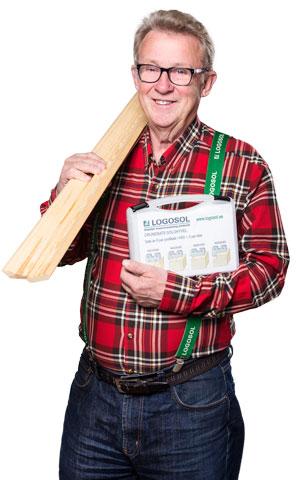

Bengt-Olov Byström
Founder of Logosol
![]() Global
Global
